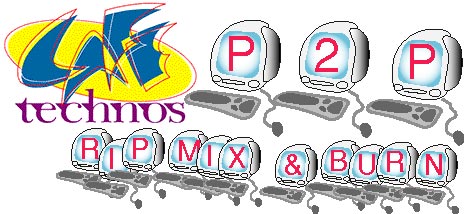

|
The Next Wave: RadioLand
|
By Thom Gillespie, Café TECHNOS Maître d¹Igital The Next Wave: RadioLandWhile researching this article, I subscribed to the decentralization list on Yahoo at http://groups.yahoo.com/group/decentralization. I posted a message to this list asking about potential applications of P2P technology to education, and I received this reply from John Robb, president and COO of UserLand Software: I read your post to the decentralization newsgroup. We think that the killer app in the P2P space is not file transfer. It is personal publishing. Within that context of personal publishing, file transfer is a utility. Imagine if everyone at Indiana University had a publishing tool on their desktop/laptop that let them publish a Web log and post document and pictures. Imagine if you could subscribe to the Web logs of everyone at school you were interested in reading (teachers, students, and groups). All the data and control would be on your desktop. That is a killer app. We are getting a lot of traction in knowledge management circles right now (for example: http://www.elearningpost.com/elthemes/blog.asp). Radio is a great application for producing and sharing knowledge with coworkers. It is an organic counter-weight to the centralized knowledge management directories provided by Lotus and others. Here is some example workflow: I publish my insight to my Web log. I post documents I am working on with annotation. I write about what is working and what isn¹t. My coworkers subscribe to my Web log. They get all my data sent to their desktop. I subscribe to the Web logs of people I think are smart and get all of their data. Most importantly, I get that data within the context of a Web log. It is human readable. It is archived, and I can get at past posts through clicking on a calendar. We have over a thousand organizations (schools + corporations) using Manila (our server-based content management system) to manage their Web sites and to allow employees, teachers, and students set up personal Web sites. We want to transition them to Radio in order to leverage the power of PCs, P2P technology. As a point of reference. My current PC is stronger and has more disk space than over 80 percent of all the servers deployed on the Web. In three years, there will be 50 million PCs deployed with more power than the vast majority of the Web servers currently deployed. It makes sense to use that power to do what the Web was designed to do: publish. Additional information on RadioLand: Here is the location where you can set up a personal site on a Manila server: http://oranges.manilasites.com. Just sign up and start publishing. Here is where you can download Radio: http://radio.userland.com/download. It is slightly technical still, but the first thing you want to do is get to the browser interface (tools>myuserland>view in browser). Point it (using the preferences) to the Manila site you created above and start editing (this allows you to publish from behind a NAT, network address translation, and a firewall). Radio is a free trial right now. Pricing has not been set, but will be set when the next version is released this summer (assume under $100). You can get a trial copy of the Manila server here: http://store.userland.com/trialwindow, or buy it here: http://store.userland.com. Academic pricing for teachers is set at $99. Universities that want to build hundreds or manage a large dynamic site of sites must pay the list $899 per license. There are lots of tutorials and resources all over the UserLand site. Thom |